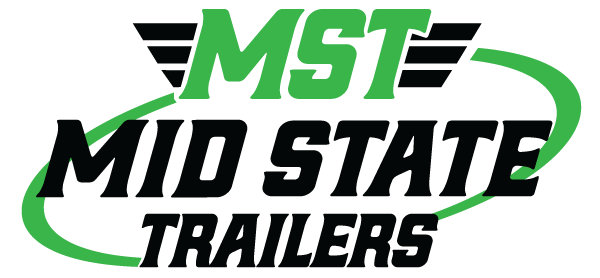DECKOVERS vs EQUIPMENT TRAILERS
Are you on the lookout for your first trailer? You’ve probably encountered terms like “deckover” and “equipment trailer,” but figuring out the difference between them can be puzzling. Fret not, for the team here at Mid State Trailers has you covered! In this blog post, we’ll demystify the differences between deckover trailers and equipment trailers, empowering you to make an informed choice for your unique business needs.
Understanding Deckover Trailers and Equipment Trailers
Before diving into the distinctions, let’s define these trailer types:
Deckover Trailers

Deckover trailers belong to the broader category of equipment trailers. Their defining feature is a design that places the deck over the wheels, hence the name “deckover.”
These trailers typically come in a variety of sizes and weight capacities, making them suitable for a wide range of hauling tasks. Deckover trailers are known for their versatility and are often used for transporting large and heavy equipment, vehicles, and materials. They are ideal for businesses that require efficient and secure transportation of bulky loads, and their capacity for side and rear loading/unloading can save valuable time at drop-offs and job sites.
Equipment Trailers (Equipment Haulers)
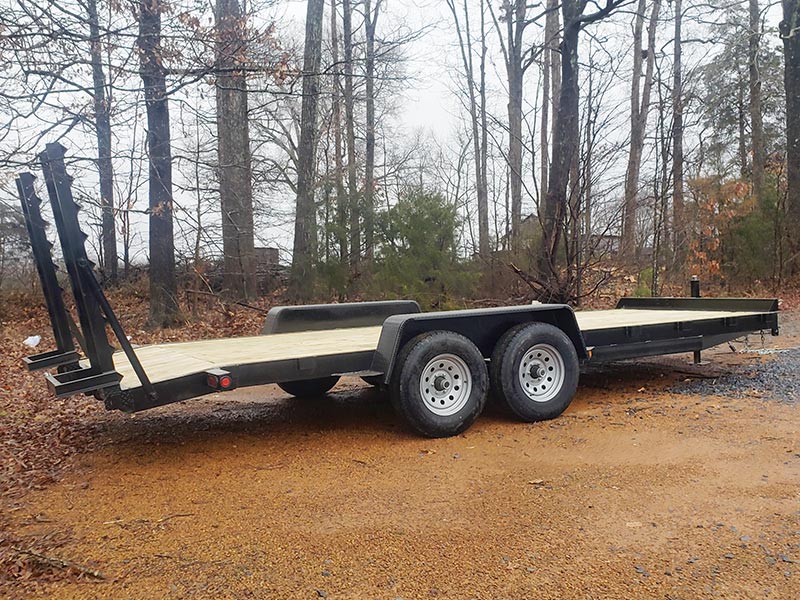
Key Differences Between Deckover Trailers and Equipment Trailers
Now that we’ve clarified what these two types of trailers are, let’s explore their key differences:
1. Deck Design
The most apparent difference lies in the deck design. Deckover trailers have a full-width deck that extends over the wheels, providing a flat and unobstructed surface for loading. With a deckover trailer, the usable width of the trailer bed can increase by a foot. On the other hand, equipment trailers with the beds situated between the wheels, like typical flatbeds and lowboy trailers with a lower deck height, have slightly less usable width, but the height of the deck can be up to 8” lower than the deckover trailer2. Loading and Unloading
Deckover trailers excel at straightforward loading and unloading, thanks to their flat deck. This makes them an excellent choice for anything that can fit on a pallet and/or be moved by a fork. Add a ramp, and you have a perfect vehicle hauler. Equipment trailers with different deck configurations may necessitate additional equipment for loading specific items as they can not be loaded/unloaded by forks on all sides. This is important to consider depending on your business needs, as quick logistics may be the factor that gives you an edge over the competition.
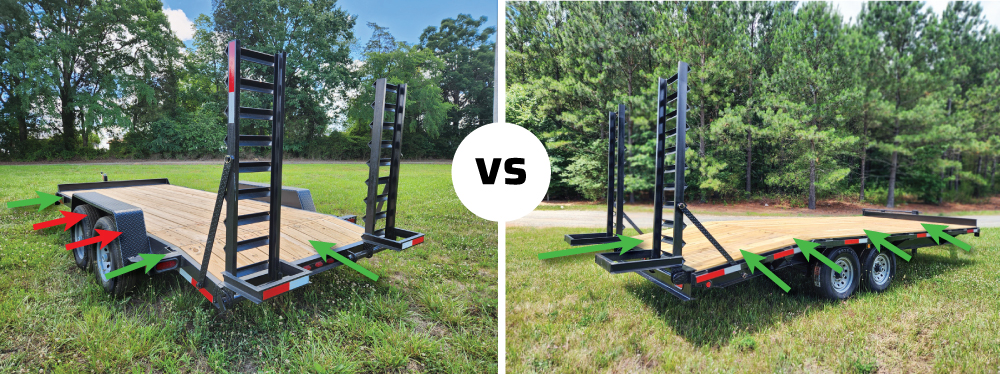
3. Height Clearance
Equipment trailers, especially lowboy designs, tend to offer better height clearance for transporting taller equipment and machinery and can make loading items by ramp easier. Because deckover trailers have the bed over the wheels, it makes for a taller trailer. If you frequently need to move items that exceed standard height limits, an equipment trailer may be the more suitable option. If you’re loading items with trailer ramps, the lower height of an equipment trailer with the bed situated between the wheels can lessen the ramp incline, making loading easier and sometimes a bit safer.
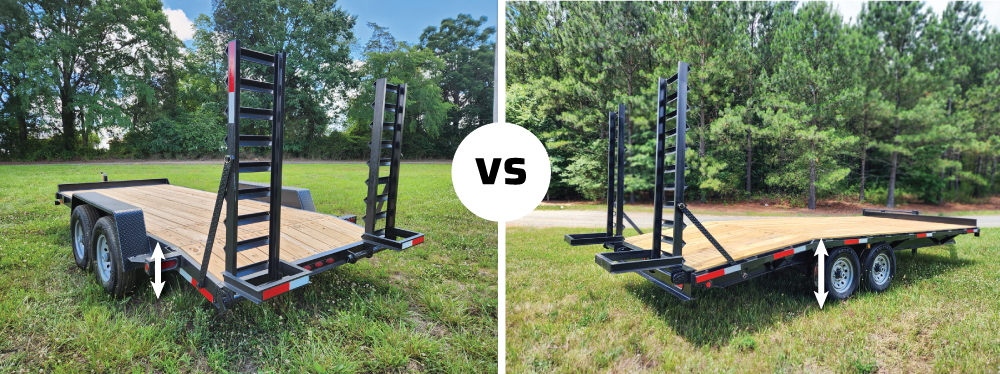
4. Weight Capacity
Both deckover and equipment trailers come in various weight capacities, but deckovers are often preferred for exceptionally heavy loads. Their design allows for a more even distribution of weight, making them a rock-solid choice for transporting hefty equipment and materials.
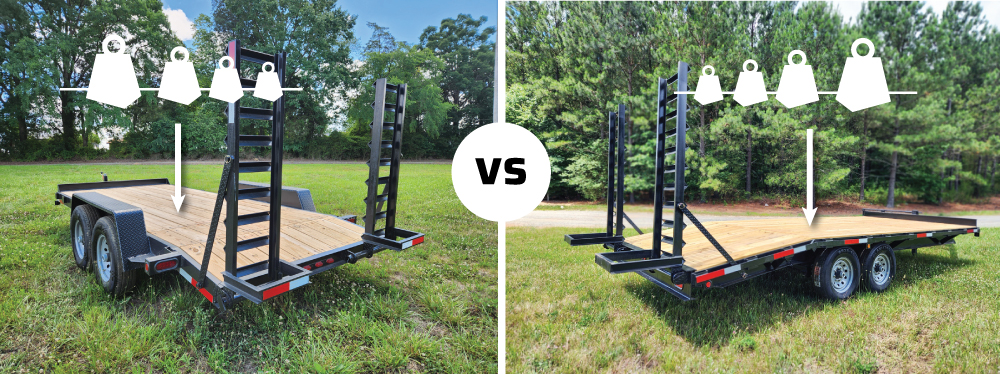
5. Versatility
Deckover trailers are highly versatile and can be used for a wide range of applications. However, equipment trailers, with their diverse deck options, offer even more versatility. Depending on your specific needs, an equipment trailer with the deck below the top of the wheels might provide a better solution.
Choosing the Right Trailer for Your Business
Now that you know the distinctions between deckover trailers and equipment trailers, it’s time to determine which one is the best fit for your business. Here are some factors to consider:
1. Hauling Needs
Start by evaluating your hauling requirements. Do you primarily need to transport heavy machinery, vehicles, or construction materials on pallets? If so, a deckover trailer might be the right choice, especially if you want easy loading from all sides of the trailer. On the other hand, if you have a variety of equipment to transport, an equipment trailer with a deck between the wheel wells might be more versatile.
2. Height Clearance
Consider the height of the equipment or materials you’ll be transporting. If you frequently need to move tall machinery or items that exceed standard height limits, an equipment trailer with lowboy or specialized design might be necessary.
3. Versatility
Consider the range of tasks your trailer will be required to handle. While deckover trailers are versatile, equipment trailers offer a broader spectrum of deck configurations to suit different needs. If your business involves diverse hauling tasks, an equipment trailer could provide the flexibility you require.
4. Budget
Budget is a pivotal element in your decision-making process. Deckover trailers tend to be pricier than certain equipment trailer options due to their specific design features. Gauge your budget constraints against your hauling needs. While an ill-fitting trailer may be the frugal choice in the short term, it is important to keep in mind that the logistical inefficiencies therein may cost you big in the long run. Ultimately, no one knows your business better than you, so we trust that you know when and where to make compromises. Our sales experts’ jobs are simply to make sure you have the information to consider each and every factor relating to your individual use case.
5. Local Regulations
Check local regulations and restrictions regarding trailer dimensions, weight limits, and licensing requirements. Ensure that the trailer you choose complies with all relevant laws and regulations in your area.
6. Future Growth
Think about your business’s future growth potential. Will your hauling needs change or expand in the coming years? Choosing a trailer that accommodates future growth can save you from having to invest in a new trailer down the line.
Conclusion
To sum it up, deckover trailers and equipment trailers with the deck below the top of the wheels serve distinct purposes, albeit with some overlap in their applications. Deckover trailers, a subset of equipment trailers, are renowned for their versatility, easy loading, and weight-bearing capabilities. Equipment trailers with the deck between the wheel wells, in contrast, represent a broader category, offering various deck designs to meet specific hauling needs.
When deciding between these two trailer types, consider with care your hauling requirements, height clearance, versatility needs, budget, local regulations, and future growth plans. Through this thorough evaluation, you’ll confidently select the trailer that best serves your business, ensuring efficient and dependable transportation of your equipment and materials.
Whether you opt for a deckover trailer or a different kind of equipment trailer, we’re here to help you streamline your hauling needs and grow your business. You can explore our selection of deckover trailers and equipment haulers on our website, or you can give our team of friendly trailer experts a call at 336-857-2888 with any questions you may have. The right trailer can make or break your business operations’ success and efficiency, so that is why Mid State Trailers is here to support you during every step of the purchasing process.
